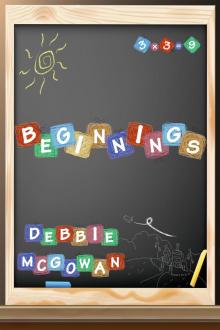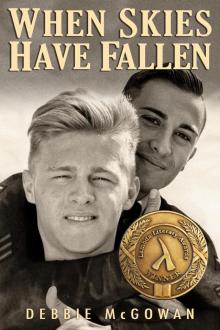- Home
- Debbie McGowan
Beginnings
Beginnings Read online
Beginnings
Hiding Behind The Couch
Prequel Novella
by
Debbie McGowan
* * * * *
https://www.beatentrackpublishing.com
* * * * *
This novel is a work of fiction and the characters and events in it exist only in its pages and in the author’s imagination.
* * * * *
Journey back to childhood, where the buds of friendship and romance blossom; take a peek into the lives of the primary schoolchildren who would become…The Circle.
* * * * *
Beginnings is a stand-alone prequel (novella) to Hiding Behind The Couch.
The story continues in Ruminations (Novel) and Hiding Behind The Couch (Season One).
* * * * *
WARNING: this story deals with themes of child sexual abuse, sudden infant death, and parents’ marriage breakdown due to infidelity. All issues are written about sensitively and in a way that is intended to be accessible for children aged ten and above.
A stand-alone prequel from Hiding Behind The Couch.
* * * * *
Acknowledgements
Thanks to Dean and Jack,
for assisting me on the matter of school football.
Great Expectations, by Charles Dickens:
Excerpt reproduced under the terms of
the Project Gutenberg Licence
https://www.gutenberg.org
Vector base for cover: zcool.com.cn.
* * * * *
Author’s Note
This story is set in England and makes reference to the English education system of the late 1970s and early 1980s (prior to the introduction of the National Curriculum in the mid-1980s).
Here is a conversion chart, with ages, so readers can compare this to the system they are familiar with:
Child’s Age / Pre-NC / NC
4–5 years / Reception / Reception
5–6 years / First-year Infants / Year 1
6–7 years / Second-year Infants / Year 2
7–8 years / First-year Juniors / Year 3
8–9 years / Second-year Juniors / Year 4
9–10 years / Third-year Juniors / Year 5
10–11 years / Fourth-year Juniors / Year 6
11–12 years / First-year High School / Year 7
12–13 years / Second-year High School / Year 8
13–14 years / Third-year High School / Year 9
14–15 years / Fourth-year High School / Year 10
15–16 years / Fifth-year High School / Year 11
16–17 years / Lower Sixth Form / Year 12
17–18 years / Upper Sixth Form / Year 13
* * * * *
Table of Contents
First Day
Siblings
A New Boy
The Reading Corner
Dawn ’Til Dusk
The Treehouse
Birth of a Princess
For Life
About the Author
By the Author
Beaten Track Publishing
* * * * *
First Day
“Now then, children, go and line yourselves up against the wall over there.”
The tall, kindly woman eyed them over as if they were all the same, which, after twenty-five years in the teaching profession, they essentially were, to her. Girl or boy, long hair, short hair, pigtails, crew cuts—it made little difference at this age. Each September brought with it a running repeat of head colds, head lice, proverbial heads being banged together, as the children vied to be number one. For some, the rank was one that would, in the future, be derived from physical strength; for others it would be their newfound understanding of the incredible frontiers revealed to them through words and pictures and ways of calculating distance and time. Many more of the boys would find success through sport, the girls in their propensity for the arts. These traits combined within each to create a unique little person, but for now, on day one—their first day of school—they were all exactly the same.
“Excuse me!” she called loudly, attracting the attention of nearly all of the children but the one her chastisement was directed at. “Young man,” she tried again. Several little boys, in a tiny huddle of shuffling legs and flaying fists, turned their heads in her direction and froze.
“Come here, please.” She called one particular boy using a finger, crooked to beckon him close.
He shrugged off his accomplices and obeyed.
“Now then, what is your name, dear?” she asked.
“Daniel Jeffries,” he replied, his eyes darting in the direction of the other boys, some of whom were snickering bravely, while others were quietly petrified.
“Daniel. That’s a very nice name,” she said, her tone of voice a mismatch for the kindness of her face and words.
Daniel nodded solemnly, not yet aware of the customary address used by pupils of all ages when speaking to a female teacher.
“I expect that with such a nice name you’re a very well-behaved young man who’s just a little over-excited today.”
He stared up at her and blinked his big brown eyes once, his lips pressed together like a tiny pink buttonhole.
“Off you go then, Daniel.”
He turned and fled, straight back into the middle of his new gang.
“And do leave that girl alone,” she added, too late.
***
Eventually, after much shuffling and impatient queuing, first outside and then along the corridor, the teachers reassembled their new classes in the school hall, prior excitement temporarily constrained by the cross-legged, arms-folded position the children had been commanded to assume.
Mrs. Jones looked along the two lines of neatly uniformed four-year-olds, mentally noting who looked most and least afraid, where the genetic associations lay, which one wore the hearing aid, and so on and so forth.
Several feet away, Mrs. McGill was doing likewise with the first years, having duly noted the presence of a new Jeffries boy in the Reception class. As if two were not enough already.
Along again from Mrs. McGill, Mr. Smythe was having a problem seating all of the second years in the allocated space—a responsibility that the junior school teachers were very much dreading having to undertake in the future. Why there should have been this sudden spike in the birth rate, no-one could say, but the average class size of twenty-four was far surpassed by the current thirty-one in second-year infants.
Meanwhile, Reception had just nineteen children, so it all looked the same to the government. However, it won’t be the education secretary dealing with this bunch for the next ten and a half months, Mr. Smythe thought begrudgingly. This year would be his last, for he was done with teaching.
A flurry of activity from the back of the school hall brought with it a short parade of bigger children, selected from the eldest pupils, each proudly displaying their enamelled prefect’s badge. They parted like curtains to allow a stretched, willowy woman to sweep her way towards the stage, her long, floral skirt swirling like a troop of whirling dervishes as she spun to face the children.
“Good morning, everybody,” she declared.
“Good morn-ing, Miss-us Kin-kade,” the mass of children responded in singsongy unison, with the exception of the newest pupils, who had yet to know of these things.
“How lovely to see you all again after a wonderful summer break. I hope you are all well rested and ready to learn.” She addressed them all and yet none of them, her gaze appearing to settle on children here and there, as she scanned the room, making eye contact with no-one in particular.
“What a beautiful Reception class we have this year,” she said, smiling down at the tiny children directly in front and to her left. They all stared up at her, eager and wide-eyed. “It
can be quite a strange experience to be in a big school like this, with lots of new children and adults, but don’t worry.” Her eyes crinkled and twinkled as she scanned their little pink and brown faces, settling momentarily on each and every one. “Our prefects will help you, and you’ll all settle in perfectly well.” She gave them one last smile and lifted her head to address the entire assembly.
“Now, as those of you who were here last year are aware, Mrs. Patel is on maternity leave, and it is my pleasure to inform you that she had her baby during the summer holidays. This is, of course, why I am standing here, talking to you today.”
“I told you,” one of the first years whispered to his friend. “My mum saw her at the shops with a pram.”
“Shhh,” Mrs. McGill urged.
Mrs. Kinkade gave her colleague a swift, sympathetic wink. “Until Mrs. Patel returns, I shall be acting headmistress.”
“Who’s teaching her class?” the other little boy asked. Mrs. McGill shot him a warning glance.
“Mr. Patton,” the friend whispered out of the side of his mouth. “Our Michael had him last year.”
“Oh,” the other little boy mouthed back.
“Yes, thank you, Andrew,” Mrs. Kinkade said loudly. “You are quite right, of course. Mr. Patton is teaching my class, and Mrs. O’Dowd is looking after the second-year juniors. Anything further you want to say, Master Jeffries?”
“No, Miss. Sorry, Miss.” Andrew blushed. His friend giggled.
“I’ll see the two of you at the end of assembly,” Mrs. Kinkade ordained and then continued as if she had not been interrupted at all. “I won’t take up much more of your time this morning, children, as I’m sure you’re all anxious to settle into your new classrooms. I have just one final notice. I see that some of you are wearing training shoes. Please inform your parents that training shoes are not school uniform. I shall be sending a letter home at the end of the day to this effect. Thank you.”
With that, Mrs. Kinkade swept her way back along the aisle and exited the hall. The prefects stood their ground. Fourth, third, second, first: the junior pupils departed next. The second-year infants, well accustomed to this ritual, looked to Mr. Smythe for their signal to stand and filed out in silence. The Reception children watched as the first years followed suit, then, understanding now what was required of them, got to their feet and scurried along after Mrs. Jones to the large, airy Reception classroom.
Their first day of school had begun.
* * * * *
Siblings
“And then you put it up through here.” Eleanor pushed the end of her younger brother’s tie up through the gap, the point tickling his chin and making him wriggle. “Stay still!”
“I don’t want to wear a tie.”
She pulled the broad end down through the knot and tugged it once to tighten it. “There,” she said, patting his chest maternally.
Ben immediately poked his finger down his collar and loosened the tie, sending it askew. Eleanor moved to straighten it, but he shoved her hand away and ran off down the stairs.
“Come on, you two, oh…” Their mother’s words trailed off as Ben leapt the last three steps and landed in front of the pushchair. “Don’t you look smart!” She smiled at him. He tore past, en route to the kitchen, to grab the last slice of toast from the table, and then back to the hallway to await the arrival of his sister.
“Ellie! Hurry up!”
“I can’t find my skipping rope.”
“Well, you’ll have to manage without it. We’re going to be late.”
Frantically, Eleanor pulled out one drawer after another, rifling through the top layer, feeling underneath, but it was nowhere to be found.
“Eleanor Davenport!”
She took one last look around her room and ran downstairs. Her mum already had the front door open and was halfway out with the pushchair. Eleanor squeezed past and lifted the front wheels clear of the step.
“Nmm!” Charlotte said, reaching up a butter-slicked hand to offer her big sister a very soggy corner of toast.
“Nmm,” Eleanor repeated with a grimace. Charlotte giggled.
“Now then,” their mother began, as they set off along the road, “have you got your pencil cases?”
“Yes.”
“Yep.”
“And plimsolls?”
“Yes.”
“What’s plimsolls?” Ben asked.
“Pumps,” Eleanor said.
“Oh. Got them.”
“And your snack money?”
“Yes.”
Ben patted his pockets and stopped, aghast. His mother continued to waddle up the street.
“Phew!” he said, pulling the coins free of his coat pocket. He caught up again. Meanwhile, Eleanor had skipped ahead and momentarily disappeared around the corner. Ben ran after her, and she slowed down so they could continue together.
The school was only ten minutes’ walk away, and as they neared it, they were joined by other children, younger ones accompanied by grown-ups, older ones by their classmates. When they reached the gates, Eleanor attached herself to a couple of other girls from her class, leaving Ben to find his own way in the world. He held back and waited for his mother to catch up.
“Hi,” one of the other mums greeted Mrs. Davenport.
“Hello.” She wearily drew to a halt and put the brake down on the pushchair.
“You’re looking well,” the other woman said, scanning the enormous bump of Mrs. Davenport’s fourth pregnancy.
“Thanks. You too,” she responded in kind. “How far along are you, now?”
“Twenty-six weeks,” the other woman replied. “And these are definitely my last.” As she said it, twin five-year-old boys came tearing towards her at speed.
“Mum! We need money for the zoo trip!”
“The zoo trip, Mum!”
They each held out a little hand and blinked up at their mother expectantly. She shook her head.
“Not today, you don’t,” she told them and shooed them away.
Eleanor’s mother laughed. “I don’t envy you, Cerys. It’s hard enough with a year between them.” She looked around for Ben and Eleanor. Ben had found a couple of boys he knew from playschool, and they were busily lamenting the discomfort of their uniforms. Eleanor was over the far side of the playground, plaiting another girl’s long, blonde hair.
“Well, at least I’m getting it all out of the way in two hits,” Cerys said dolefully. It had been quite a shock to find out she was expecting twins again—a girl and a boy this time, the radiographer predicted confidently.
The school bell sounded, and both mothers watched on as their various offspring found their places in the tiny year-group-based squads forming across the playground.
“Reception children, over here!” one of the teachers shouted, calling the tiniest pupils to her. Ben was there like a shot, standing right next her, eagerly staring up into her face. She glanced down at him and smiled. He grinned back. “Two lines, please,” she ordered, and the children quickly arranged themselves into higgledy-piggledy double file. A little way across the playground, the twins stood amongst the second years, which they were not.
“Come here, boys,” their teacher called, and they mooched their way over to their own class, giggling and shoving at each other and the rest of the children. Eleanor and her friends moved forward to fill the space they had left.
“Do you know what you’re having this time, Marie?” Cerys asked Mrs. Davenport.
“Another boy.”
“That’s nice. Two of each.”
“Hmm,” Mrs. Davenport agreed vaguely. Charlotte had somehow freed herself from the straps of her pushchair and was now standing up, pointing across the playground and shouting, “Ey-yeeeee!” in an attempt to catch her sister’s attention. A whistle sounded, and the entire body of children fell silent.
“Ey-yeeee!” Charlotte shouted, waving her toasty little fist in the air.
Eleanor blushed and studied her shoes.
>
“Right, Trouble,” Mrs. Davenport said, “let’s get you home.” She re-seated and secured her youngest daughter in her pushchair, paused a moment to observe the procession of primary pupils as they made their way inside, and then turned homewards, parting company with Cerys at the corner of the street, each headed for a day of washing and cooking, and ironing and cleaning.
***
“What are you here for?” Mrs. Patel asked the eldest of the three boys sitting outside her office.
“Eating sweets in class, Miss.”
She nodded once. “And you?” she asked the second boy.
“The sparklers, Miss.”
She nodded again and turned to the third, youngest boy.
“Fighting, Miss, but I didn’t start it, Miss, it was—”
She glared at him with eyebrows raised, and he instantly fell silent. She walked past them, went into her office and picked up her phone.
“Could you call Mrs. Thurston for me, please?”
“Certainly, Mrs. Patel,” her personal assistant said cheerily. The line remained quiet for a few seconds. “Mrs. Thurston for you.”
“Thanks. Hello, Mrs. Thurston? It’s Mrs. Patel here.”
“Which one is it this time?”
“All three, I’m afraid.”
***
“Do you have any brothers and sisters?”
“No, Sir.”
Mr. O’Malley uncrossed his legs and crossed them again.
“It’s OK, though, because brothers fight with you, and I don’t like fighting.”
“What about cousins?”
“No, Sir.”
“Who do you play with in the holidays?”
“No-one, Sir.”
Mr. O’Malley frowned. “So what things do you like to do?”
“I like reading, and writing stories. Sometimes I ride my bike in the garden.”
“What do you like to read?”
“All books. I don’t mind.”
Mr. O’Malley was struggling. Usually, he could talk the children round by asking them about their siblings and friends, the things they enjoyed doing, and so on. But not this child.
“You want to talk about my dad dying,” the boy said.
“Not unless you want to talk about your dad dying.”
The boy shrugged. “It’s OK.”
“Do you understand what it means when someone dies?”

 Beginnings
Beginnings When Skies Have Fallen
When Skies Have Fallen Breakfast at Cordelia's Aquarium
Breakfast at Cordelia's Aquarium The Making of Us
The Making of Us Cherry Pop Valentine
Cherry Pop Valentine The Harder They Fall
The Harder They Fall Seeds of Tyrone Box Set
Seeds of Tyrone Box Set